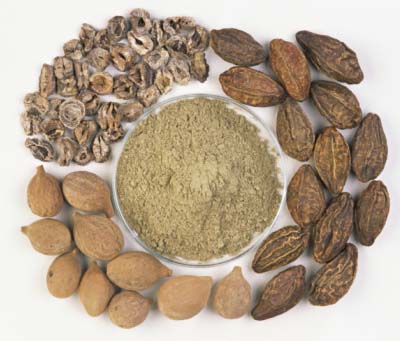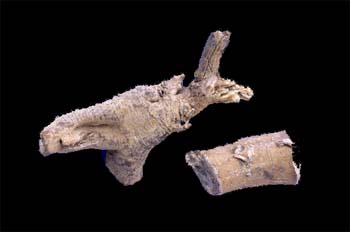Feb 05, 2026
Feb 05, 2026
 Triphala :
Triphala :
How It Works
Bottom Line: The anticancer effect of Triphala has not been confirmed in humans.
Triphala is an herbal formulation used in the Indian medicinal system of Ayurveda for the treatment of various ailments. It consists of three medicinal plants: Emblica officinalis, Terminalia chebula, and Terminalia belerica. It is used for anemia, jaundice, constipation, asthma, fever, chronic ulcers, inflammation, obesity and to strengthen the immune system against infections such as pneumonia, tuberculosis, and AIDS. Triphala was shown to have beneficial effects in studies done in laboratory and in animals. However human data are lacking.
Purported Uses
Research Evidence
Several laboratory studies have shown that Triphala has beneficial effects. However, it has not been studied in humans.
Side Effects
Intestinal gas Stomach upset Diarrhea.
Constituents
Amla (Emblica officinalis) Myrobalan (Terminalia chebula) Belleric Myrobalan (Terminalia belerica).
Mechanism of Action
The exact mechanism of action is not known although the polyphenols and flavonoids are thought to be responsible for many of Triphala's effects. Gallic acid, a major polyphenol in Triphala, has antioxidant property. Triphala also increased the reactive oxygen species (ROS) in breast cancer cells (MCF-7 and T-47D), resulting in apoptosis. Terminalia chebula, one of the components of Triphala, was shown to be a potent hyaluronidase and collagenase inhibitor that prevented degradation of cartilage. Triphala also protected mice from radiation-induced mortality. Oral administration of Triphala enhanced the immune functions in rats.
Adverse Reactions
Intestinal gas, stomach upset, diarrhea.
Ashwagandha : How It Works
Bottom Line: While ashwagandha has shown an ability to hinder the growth of cancer cells in laboratory tests and enhance radiation therapy in animals, it is unknown if these effects can be replicated in humans.
 A popular Ayurvedic medicinal substance derived from the root and berry of the plant. Ashwagandha contains numerous biologically active components. It is thought that some of these components can influence potent hormone-like substances that cause arthritis inflammation. Extracts of the root also increase the number of red and white blood cells and platelets in the blood. Ashwagandha has been shown to relax the central nervous system in animals. Studies in laboratories have shown that extracts of ashwagandha kill some cancer cells and enhance some immune cells. It is thought that the structure of ashwagandha extracts may damage the cancer cells ability to generate the energy it needs to reproduce. Ashwagandha also reduces the level of glutathione, an antioxidant, in tumor cells which may enhance the effects of radiation therapy against those cells. Studies in animals have demonstrated possible toxicity, however comparable effects have not been observed in humans.
A popular Ayurvedic medicinal substance derived from the root and berry of the plant. Ashwagandha contains numerous biologically active components. It is thought that some of these components can influence potent hormone-like substances that cause arthritis inflammation. Extracts of the root also increase the number of red and white blood cells and platelets in the blood. Ashwagandha has been shown to relax the central nervous system in animals. Studies in laboratories have shown that extracts of ashwagandha kill some cancer cells and enhance some immune cells. It is thought that the structure of ashwagandha extracts may damage the cancer cells ability to generate the energy it needs to reproduce. Ashwagandha also reduces the level of glutathione, an antioxidant, in tumor cells which may enhance the effects of radiation therapy against those cells. Studies in animals have demonstrated possible toxicity, however comparable effects have not been observed in humans.
Purported Uses
To treat cancer
While ashwagandha has shown promise in animal and laboratory studies, few trials have demonstrated an effect in humans.
To treat diabetes
No scientific evidence supports this use.
To treat epilepsy
No scientific evidence supports this use.
To reduce fatigue
Ashwagandha has been shown to increase blood cell counts in the lab, however it is unclear if this will reduce fatigue in humans.
To treat digestive disorders
No scientific evidence supports this use.
To maintain health
Ashwagandha has antioxidant properties in lab tests, however it is unclear if it will have any effect on humans.
To reduce pain
Ashwagandha has been shown to have a tranquilizing effect in animals. It is unclear if this will reduce pain in humans.
To treat rheumatoid arthritis
A clinical trial showed effectiveness of a herbomineral formula containing ashwagandha. To what extent ashwagandha played a role in the reduction in pain severity and disability is unclear.
As a sedative
Ashwagandha has been shown to have a tranquilizing effect in animals. It is unclear if it has a similar effect in humans.
To treat skin infections
No scientific evidence supports this use.
To relieve stress
Ashwagandha has been shown to have a tranquilizing effect in animals. It is unclear if it has a similar effect in humans.
Research Evidence
Arthritis Pain:
Forty-two volunteers with osteoarthritis participated in a trial of a herbomineral formula containing ashwagandha. Volunteers were randomly assigned to receive either a combination of herbs and minerals or placebo for three months. After a fifteen-day washout period, treatments were reversed. Volunteers in the treatment group reported significant drops in pain severity and disability score with few side effects. Because a combination of herbs was used, it is unclear if ashwagandha played an important role in the results.
Warnings: Do Not Take If
You are pregnant.
(Ashwagandha may induce abortion.)
You are taking sedatives.
(Ashwagandha may increase sedative effects.)
Scientific Name : Withania somnifera.
Family: Solanaceae
Constituents
Alkanoids: isopelletierine, anaferine
Steroidal lactones: withanolides, withaferins
Saponins: sitoindoside VII and VIII Iron
Mechanism of Action
Alkaloids, steroidal lactones, saponins and withanolides are thought to be the biologically active components. Studies have pointed to cyclooxygenase inhibition as the cause of the herb's anti-arthritis properties. Ashwagandha's anti-inflammatory effects were comparable to hydrocortisone sodium succinate in rats. The root extract of the herb produced significant increases in hemoglobin concentration, red blood cell count, white blood cell count and platelet count. Ashwagandha has been shown to exhibit antioxidant effects in the brain and to have a tranquilizing effect on the central nervous system in animals. In vitro, isolates from the root of the plant have cytotoxic properties against H-460, HCT-116, SF-268 and MCF-7 cell lines. Ashwagandha increase cytotoxic T lymphocyte production. Other studies show ashwagandha's cytotoxicity is related to its structure and that it enhances ATPase and inhibits succinate dehydrogenase activity, impairing oxidative phosphorylation. In animal studies, ashwagandha can increase the effects of radiation therapy and inhibits tumor growth. The herb also reduces tumor GSH levels which may contribute to the enhancement of radiation response. Ashwagandha can reverse paclitaxel induced neutropenia in mice. Significant toxicity was observed at high doses in animal studies, however, toxicity studies in humans are limited.
Disclaimer:
Information provided in this article is for the sole purpose of imparting education on Ayurveda and is not intended to diagnose, treat, cure or prevent any disease. If you have a medical condition, please consult your physician.
07-Sep-2008
More by : Dr. Bhavana Joshi

|
Respected madamme, It is great pleasure to know that you are using herbal combination for treating cancer patients. I am practicing Consultant Biochemist and Nutritionist . At present I am associated with Appropriate Diet Therapy centre as a consultant . At our center we do diet conultations for various metabolic symdromes. Recentaly we have started using Herbal combinations for Breast cancer, Colonic Cancer, and maintaining data. We will be glad if you also share your experiance in using herbal treatment as a Palliative treatment.for cancer patients. Waiting for your positive response. Dr. N. V. Pai |

|
Very happy to see ayurvedic physician as a oncologist Thanks Dr Prafull Kumar BAMS |

|
respected madam, this is dr.surya kumar.pammi an ayurvedic graduate from nagarjuna university andhra pradesh. very glad to see an ayuvedic physician as oncologist in net. being in traditional ayurvedic family and expierenced in ayurvedic herbal formulations since 2002 for variuos companies in andhra pradesh i am very happy to see you in net. dr.surya kumar.pammi 09848529627 |